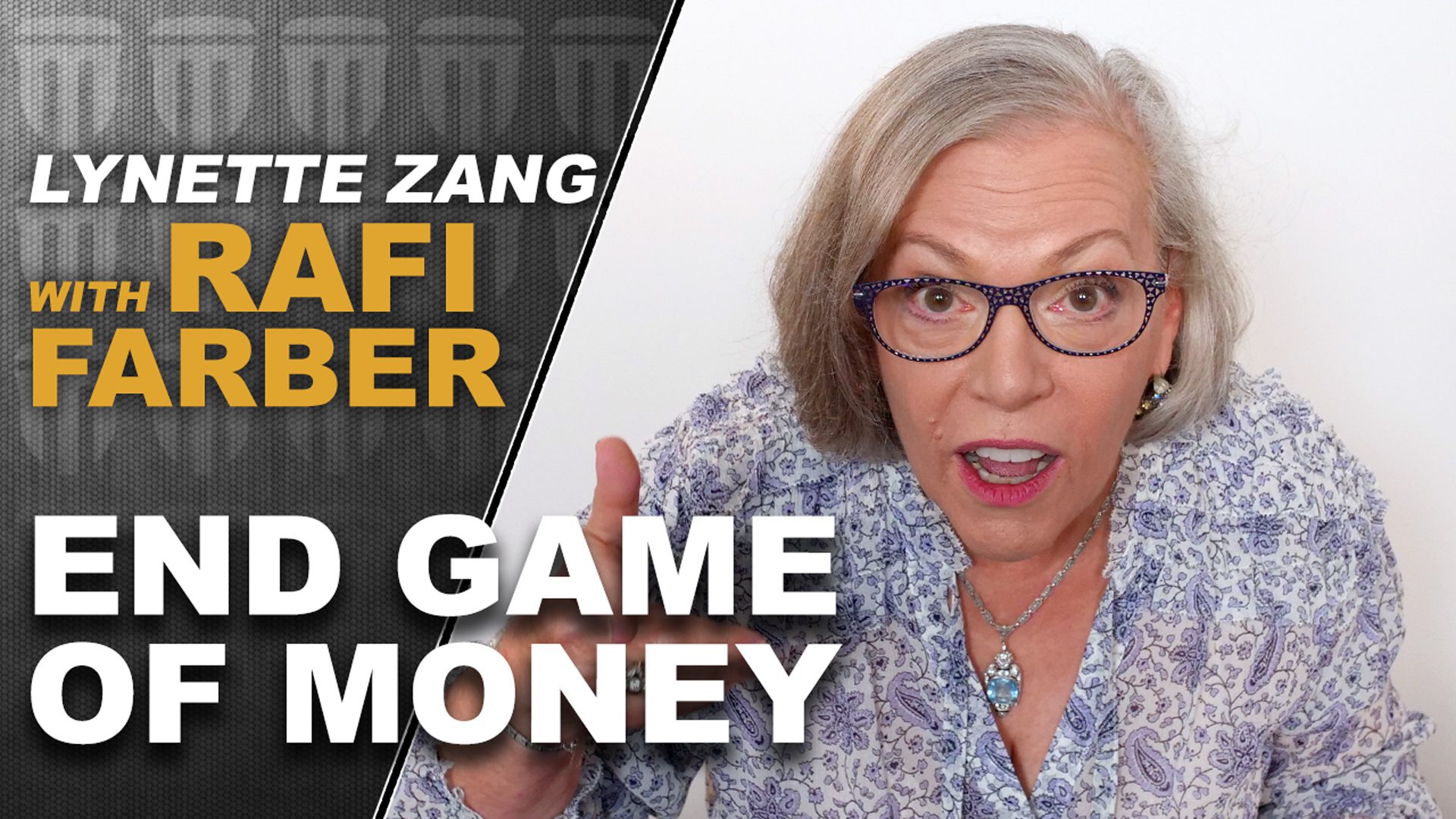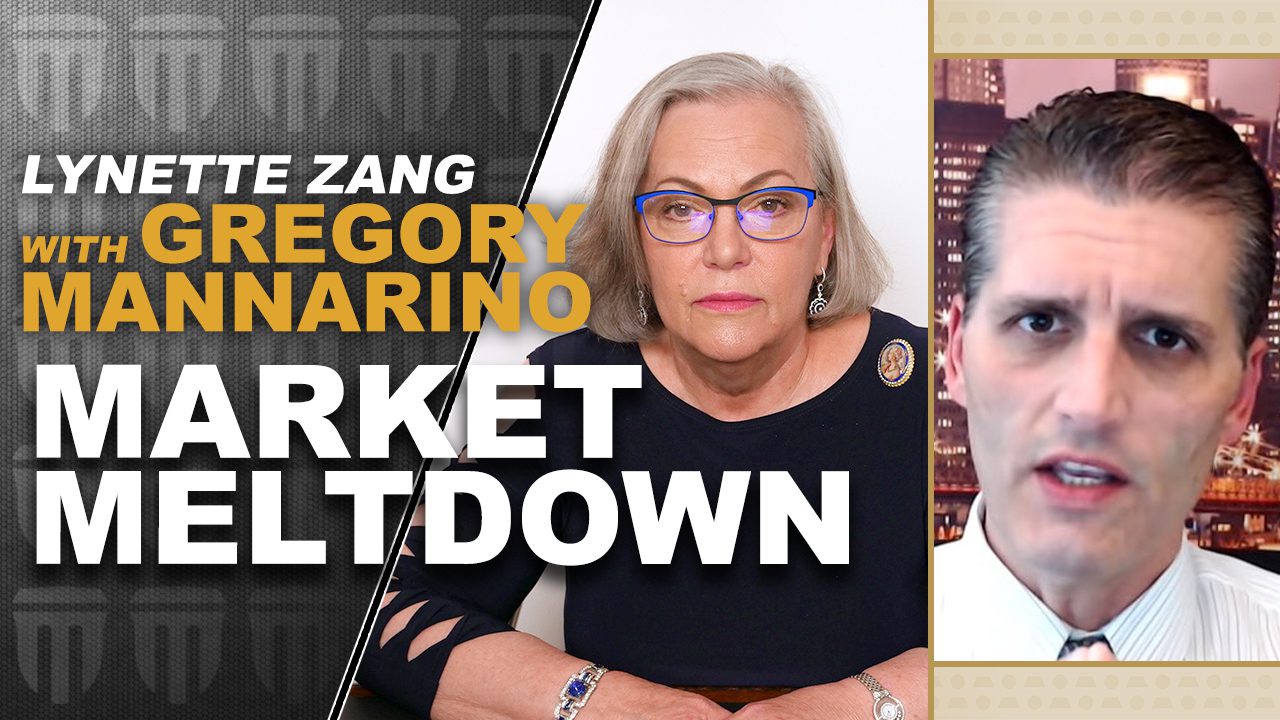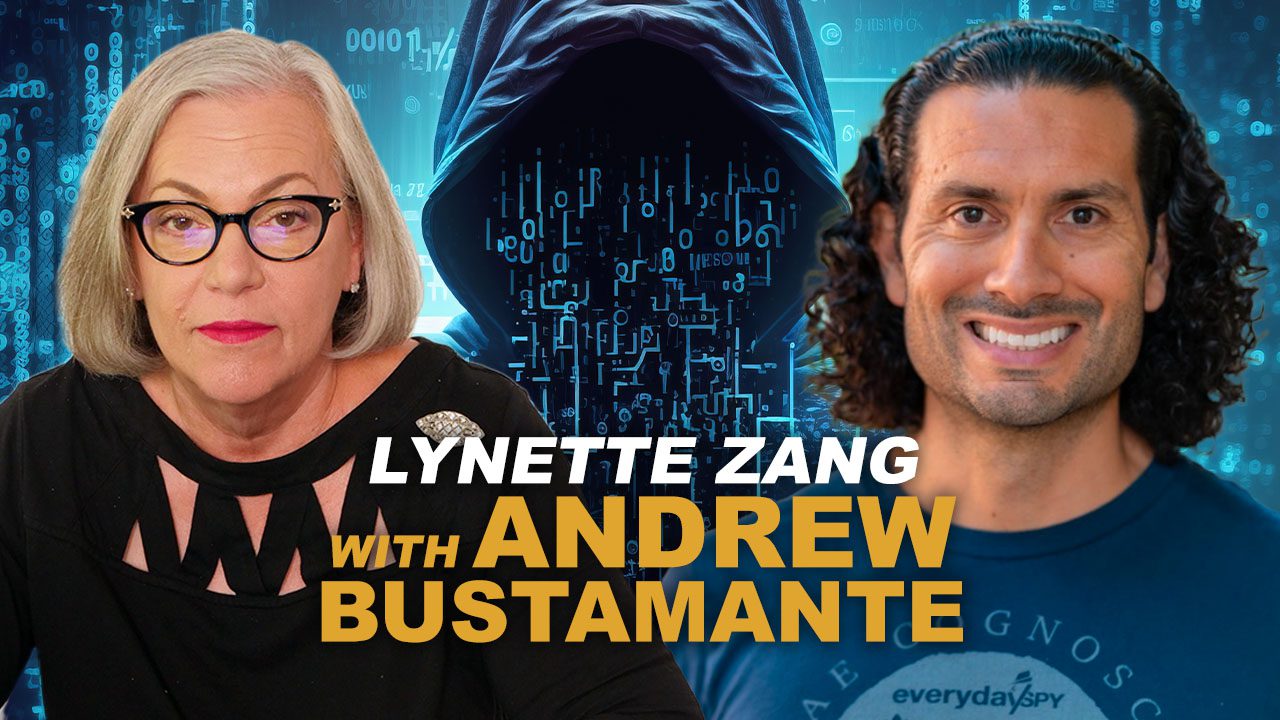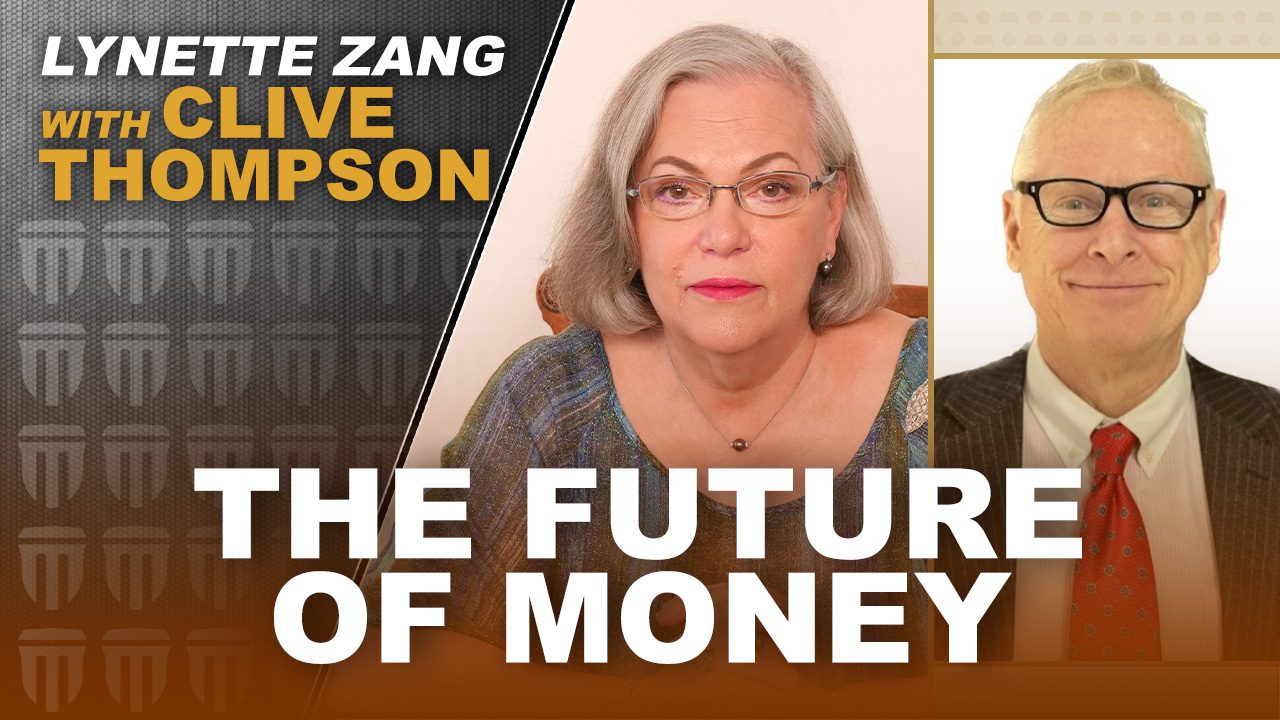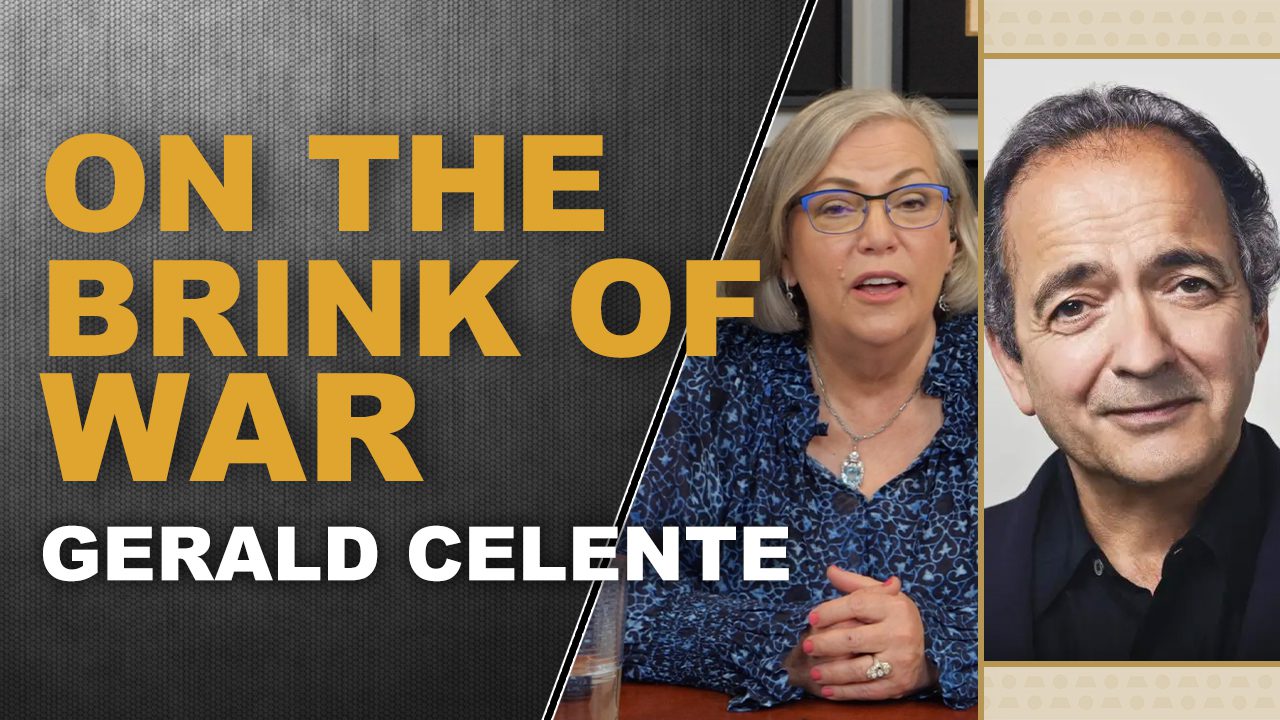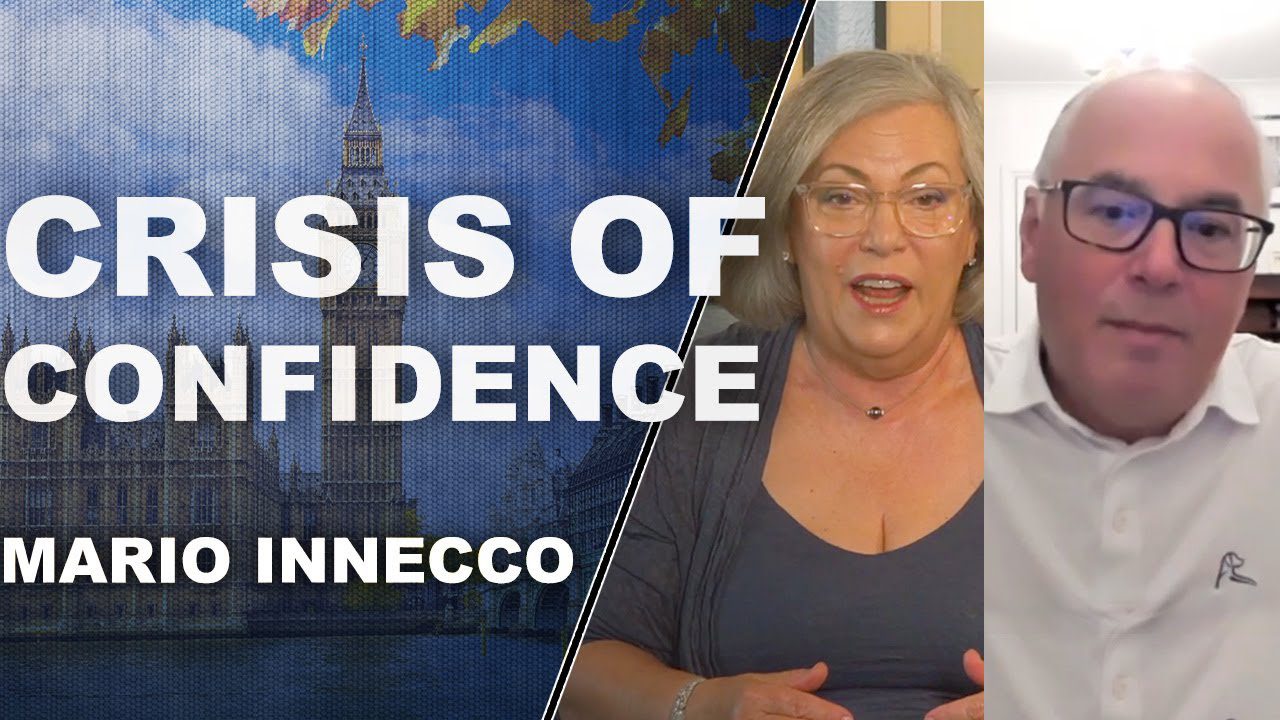High Interest Rates & Inflation…Wolf Richter & Lynette Zang

Welcome to a very special edition of Coffee with Lynette. Today, I have a really wonderful returning guest, my good friend Wolf Richter. His site is called Wolf Street. And on there you’ll find in-depth writings on economics, business, financial issues, Wall Street shenanigans, lots of those right complex entanglements and other debacles and opportunities that catch his eye.
CHAPTERS:
0:00 Wolf Richter from Wolf Street
1:13 Government Bond Markets
12:52 Housing Bubble Pop
22:13 Finalization of Everything
26:32 CBDC Race
30:08 Inflation
37:02 Functions of Money
41:00 Public Confidence
BLOG:
The cheap money trade is over, at least for now, and that is becoming a massive problem for debt and leveraged-laden companies, including financial and non-financial corporations. As most central bankers, led by the Fed, raise rates to dampen demand, they lead us into the next financial crisis.
The seeds of this next crisis were sown in 2008 when the world dropped interest rates to near zero and kept them there until this year. Add to that massive money printing to reflate stocks, bonds and real estate, the Fed, and all central bankers, painted themselves into a corner that is impossible to get out of.
Failing to see the structural changes and market distortions created by their free money policies, they are now urgently warning about impending forced selling. Forced selling occurs when assets or securities are involuntarily sold in the event of an uncontrollable situation. One example of this is margin calls. When people borrow to buy stocks and the market drops, those debtors are forced to deposit more money or securities to bring their account up to the minimum maintenance margin. If they are unable to make that deposit, the brokerage will liquidate securities held in that account to meet the margin. This in turn could push prices down even more, requiring even more forced selling and on and on into an extremely dangerous doom loop.
Now you might think that will not impact you, particularly if you are out of stocks and bonds like I am, but everyone will feel the impact because the real danger is not in the markets we can see but in those hidden derivative markets that dwarf the ones Wall Street shows us.
To quote Warren Buffet, “Derivatives are financial weapons of mass destruction, carrying dangers that, while now latent, are potentially lethal.â€
So far, there have been two derivative implosions. The first was in 1998 when Long-Term Capital Management L.P. (LTCM), a hedge fund whose derivative bets on sovereign bonds went so wrong that the Fed and Wall Street stepped in to avert a global collapse. This is similar to the Asian currency crisis and Russia’s currency collapse.
The second was in 2007 and the derivative implosion on subprime mortgages that triggered the “Great Financial Crisis.†The issues that caused the crisis were not dealt with; they were papered over and propped up by the QE experiment. We are now about to experience the end result of that experiment.
Because the real danger lies in these complex, opaque leveraged derivative instruments that may well prove to be lethal as Warren Buffet says.
By June 30, 2023, over $610 trillion notional derivative contracts must be converted from LIBOR interest rate benchmark to SOFR interest rate benchmark. This shift is dangerous, complex and has NEVER been attempted before. But with central bankers and all the usual players like Chase, Citi, and similar others driving this bus, what could go wrong?
And perhaps, what they are really warning us of is this next financial crisis. Will you be ready? Do you own gold?
TRANSCRIPT FROM VIDEO:
Lynette Zang (00:00):
Welcome to a very special edition of Coffee with Lynette. Today, I have a really wonderful returning guest, my good friend Wolf Richter. His site is called Wolf Street. And on there you’ll find in-depth writings on economics, business, financial issues, Wall Street shenanigans, lots of those right complex entanglements and other debacles and opportunities that catch his eye. I can tell you his work is brilliant, insightful, and very, very understandable. And you know that I utilize his work all the time in my own work. I’m so happy to have him back. Today we’re gonna talk about inflation, derivatives, CBDCs, and so many more things. So Wolf, thank you for coming back today.
Lynette Zang (01:13):
I’m so happy to have you back Wolf. Thank you for being here today.
Wolf Richter (01:18):
Thanks for having me back.
Lynette Zang (01:20):
Always, always. And we always have great conversations. And I wanna jump into something that I’ve been talking about and exploring, and I believe you have too. And we’re watching what’s going on in the markets, and let’s particularly talk about the bond markets, and even taking it one step further, the government bond markets and what, I mean, I think Great Britain is like the canary in the coal mine, right? And warning us about what’s about to happen. So they’re just like a step or two ahead of us. What do you think about the turmoil over there?
Wolf Richter (02:00):
Well, they had pension fund, leverage pension funds. They used a system of leverage that didn’t go with spiking interest rates and the government bond market there. And so they tested those leverage, but nobody tested it for that kind of spiking interest rates. And so the, the, you know, the system blew up. And so the pension funds had to deleverage and cost a huge amount of turmoil over there, which cost the Bank of England to step in and, and buy some of those bonds. And, and, you know, there quantitation, there’s all kinds of stuff going on. And you know, leverage does that. So when, when you have a leverage that a leverage position where something goes against you, you have to unwind the position and you become a forced seller and of a very large amount of securities. And you know, that’s the kind of thing when you, when you have an over leveraged economy, you’re gonna run into that. You’re gonna have companies do that. You’re gonna have investment banks do that. You’re gonna have pension funds do that, and it’s gonna be one thing after another. I mean, this was a, a sort of a, a mini crisis that could have you know, spiraled further out of control. But it’s, it’s now kind of wound down at a fairly substantial cost to the investors to well lined up on the wrong side. So I think, we’ll, we’ll see plenty of this kind of stuff going on.
Lynette Zang (03:31):
Well, I agree with that. But let’s take that a step further because I think that this is something, so correct me if I’m wrong, but I think this is something we agree on, that this whole scheme is Ponzi. It’s, it’s, it’s all make believe and therefore it requires confidence. And so the crisis and confidence of the Bank of England, which is also something that we face here at the Fed, I mean, do you really think that everything is hunky dory? Because they raised interest rates, which are tightening, and then they were forced to go in and buy bonds, and then they sold a little bit of the bonds that they did in the QE. So it’s like gas pedal break, gas pedal. I mean, do you think that, that the markets and the public still has confidence in the Bank of England? Do you think they can pull this off? Do you think they can calm everything down and everything will be okay?
Wolf Richter (04:36):
Well, we know things are not going to be okay because nobody expected to have, you know, 4%, 5% government bond yields this time around. And, and now we have them, and the UK has, and we have them. And you know, so a lot of, I mean, you look at your ordinary long term bond funds, you know, that conservative investors have invested in, they’re down 30, 40%, you know, and you know, these are not, you know, generally people that, that take big risks. And so now you have hedge funds out there that, that have hugely complex positions with leverage positions with government securities, and you have these pension funds that did that. So you know, I, I think you know, central banks don’t really want to control all of this. I don’t think, you know, there, there’s, there’s a good amount of, of, well, let’s just let some of these things blow up out there, <laugh>, you know, I mean, they, it’s, it’s gone over overboard. And I think as long as it doesn’t spiral out into kind of a major crisis, I think they’re just gonna look at this and say, Well, okay, so these pension funds lost a bunch of money. It’s for somebody else to figure out how to yeah. How to satisfy the demands of the beneficiaries because it’s their money, you know, it’s got blown out. And, and so I think central banks are going to let this run as long as there’s no big major crisis.
Lynette Zang (06:03):
Do you think they will let it run until there is a big major crisis that they’re maybe driving us into?
Wolf Richter (06:12):
Yeah, so this Bank of England got this one stepped out, you know, this brush fire the Fed has a different facility, has the repo facilities that it put in place a year ago. And so it can continue to do QT and raise rates if it wants to, but if it has a sudden flare up in some place, it can for a week or two act through the repo market, which is a multi-trillion dollar a day market. So it’s very huge. And, and if the Fed can calm that down, you know, I think it, it can keep a, a brush fire of I’m turning into a major national crisis and, and, and just keep on going. You know, I, I think that’s the, that’s the plan here. And, and you know, who knows what’s going to happen? Well, we’ve got a housing market that’s really turning into a mess and we’ve got inflation. So inflation is keeping all the central banks away from, from buying stuff. You know, if you, if you have 8%, or in the UK they have 10% inflation, you know, if, if you start restart key and cut breaks down, yeah, you’re gonna have hyperinflation, <laugh>, Right? It’s all over.
Lynette Zang (07:21):
Well, I think that’s where we’re headed anyway, is to hyperinflation. But, you know, when we look at what’s happening to the bonds, the government bonds in the US like the US Treasury, and you look, the treasury well notes, the 10 year notes, and you look at that, the treasury may have to stop in as buyer or step in as buyer of last resort because there’s very little, there’s rapidly evaporating liquidity in these markets.
Wolf Richter (07:55):
Yeah. Well that’s, that’s an interesting deal actually, they’ve considered this before, and I’ve done it before. What the treasury would do would, would essentially buy old long dirty bonds that are hard to trade. I mean, if you ever had a 30 year bond that’s 10 years into it and you’re trying to sell it, I mean, you can sell it, but you’re gonna get ripped off, you know, because that’s just how it is. And as a retail buyer, I, you know, I don’t do that anymore. I, I buy it auction hold to maturity. And because you get ripped off with these older bonds if you try to sell ’em. Yeah. And so they, they do, they would buy those older bonds and they would issue newer bonds and trade more easily. So it would be that kind of swap and they would create liquidity through that by exchanging, essentially exchanging these bonds. It’s a complicated thing, and I’m not sure they would do it, you know, that you have all kinds of issues with that. But they’re, they discuss it and, and you know, they’re, you have a big institution that sits on two billion dollars worth of older bonds that it has to sell, like those pension funds, that’s where you get a liquidity crisis, you know, because there are, there may not be buyers out there that can buy at a price or that want to buy at a price that the pension fund or the hedge fund can survive. You know, they’re gonna buy a much lower price and that it causes this issue. And, and so this is what’s called liquidity in the bond market, where it really means that you can’t sell for the price that you want to get or that you have to get. And there’s a price out there, but it’s a lot lower. And that’s when they, when the bond market talks about lack of liquidity, you know, because buyers a kind of, Okay, I’m buying, but not at that price. I’m gonna be lower.
Lynette Zang (09:39):
Right. A lot lower. So where would, where would the treasury get the money to buy the, off the run the bonds that are in the secondary market and then swap them into new bonds?
Wolf Richter (09:54):
Yeah, so it would have to issue, I mean, it has a lot of money in, in its account always, you know, I mean, that’s, it’s a huge checking account. It has. So if it’s a smaller issue that buys, it can just flow through. It’s issuing a lot of bonds all the time, and it’s increasing the bond issuance now. And, and, and the first quarter so is essentially a, a trade. And I would issue new bonds and they would use those funds to buy these older bonds. And, and so there, it wouldn’t really impact the overall debt of the United States. It doesn’t really do anything in terms of the overall debt. It just changes the types of bonds that are out there
Lynette Zang (10:32):
And the maturity of the bonds. Are they going, they’re going shorter?
Wolf Richter (10:36):
Yeah. So I don’t know how they will do that. You know, I mean, they, they could go shorter term, but even though also have complications with that, if, if, if they do that, you know, so I mean they, that could, and that could go longer term or that could, if there’s a 30 year treasury that that has 10 years left, that could issue 10 year notes, for example, instead of 30 year bonds. But I don’t know if they’ll ever do this. You know, there’s been some discussion about this, but it’s just complicated. And liquidity isn’t that bad. I don’t really have to do it. It’s just sellers are gonna lose a little bit of money when they sell. That’s all that means.
Lynette Zang (11:17):
So would they be doing this primarily for the banks that are holding the treasuries on their books, do you think? Just to enable them like they did back in 2008 when they paid AIG a hundred percent on their derivative trades so that those losses, so losses were not passed on to all of the other banks on the other side of those derivative trades, City, American, etc.
Wolf Richter (11:43):
I don’t, I mean, I don’t really would, I’m not thinking of the banks at this moment. I’m thinking of big leverage funds like a hedge fund or these pension funds that might be forced to sell, you know, and treasuries all, I mean, banks hold treasuries as a form of capital. So and they have other ways to deal with the Fed, and they have the repo markets available to them, you know, they have other banks.
Lynette Zang (12:10):
Yeah. And the hedge funds are big repo buyers as well.
Wolf Richter (12:14):
Yeah. And you know, the hedge funds that borrow in the repo markets mm-hmm. <Affirmative> and the banks usually lend to the repo market. And so that when, when the hedge funds borrow in the repo market and the repo market gets, gets leery of them the funding disappears, and then they have these long term leverage positions and they can’t get funding for them. And, you know, we had this issue in like 2019 with with the mortgage treats that blew up. And I couldn’t get the funding in the repo market anymore. None. The Fed stepped into bail out the repo market. So, I mean, this is the kind of stuff we, I expect we’re going to get, you know, this.
Lynette Zang (12:52):
Well, you may, and I wanna come back to that in a second, but I wanna veer here just for a minute, because you brought it up before, and you recently did a piece on the housing bubble popped, and the Fed can let it rip. So can you talk to our viewers about why the Fed can now let, when the housing market is 30% of the US GDP and more in some places, So it’s a really important component of the global economy, why can it let it rip now?
Wolf Richter (13:25):
Well, it’s because of the banks last time we have the housing bust and mortgage crisis was really taking down the banks, you know, and, and this time around the risk have been spread far and wide. So number one, a very large portion of the mortgages have been securitized into mortgage backed securities and have been guaranteed by the government. So it’s a taxpayer that’s on the hook. Mm-Hmm. <affirmative>. And then there’s other mortgages that have been securitized into private label mortgage backed securities. So the government is not on the hook, but they are spread around among global investors. So insurance companies, pension funds bond funds, you know, if you have a 401K with a bond fund, and you probably got some of those. And so the risks are really spread away from the banks. The banks are not that exposed anymore to, to mortgage’s that they’re, you know, the exposure’s pretty small by the banks to, to residential mortgages. Now, there are some banks that regional banks, the smaller banks that have a large exposure, relatively large exposure to commercial mortgages. And so that could be a bigger problem. But, but the numbers are much smaller. You know, these are relatively small banks that are relatively concentrated in, in the local commercial mortgages and and such as office buildings and those kinds of things. They’re eventually gonna go bad. But, but that’s a, you know, that’s not a, a systemic banking issue that’s gonna have one or two banks that are gonna top, because mine are smaller. Banks are gonna top those of that. So residential mortgages, the bank’s essentially off the hook, now it’s the investors in the government or the taxpayer that’s on the hook. And so the Fed is there to protect the stability of the financial system and that that’s, you know, why it stepped in last time. So this time it could still step in, but now we’ve got 8% inflation, you know, so.
Lynette Zang (15:21):
It’s a lot harder. Their hands are kind of tied.
Wolf Richter (15:24):
Their hands are tied yeah. And they, they said, we’re gonna have to take care of inflation and the banks are not at risk, so we don’t worry about the banks and the housing market will find its own, it’s a market, you know, markets are very good at finding their own level where they’re supposed to be, where they want to be. You just, it’s a little rough getting there, but they’ll find it, you know?
Lynette Zang (15:44):
They’re left alone.
Wolf Richter (15:46):
Yeah. That’s what markets will do.
Lynette Zang (15:49):
But, but just kind of staying there for a minute, because I know a lot of the mortgages and all of those products have been offloaded to shadow banks that have created these products and sold them to the public. So yes, of course they’re going to eat it in the shorts, but don’t these private or these shadow banks get a lot of their funding from the commercial banks, So there might be like a little separation, but it’s not a complete separation.
Wolf Richter (16:17):
Yeah, so in these shadow banks, like rocket companies, you know, that the largest, largest mortgage lender in, in the United States. And so what’s different from them into regular banks is that they don’t get the funding from deposits, right? So they get the funding from, from borrowing or from selling the mortgages and, and or from bonds and from whatever. So they get the short term funding from banks. And so they, they get a billion dollar line of credit from Wells Fargo or from a consortium of banks, and then, then they use that to fund the mortgages. And then when they have enough mortgages together, they bundle them and they, they essentially sell them to somebody like Fannie Mae or Freddie Mac, and then they get the money back and they pay off the bank. Yeah. So you have a certain amount of time that a a shadow bank sits on these mortgages, and these mortgages are funded by a, by a warehouse line of credit from another major bank. And and then the bank is at risk for, for that line of credit secured. So the the shadow bank is, is at risk for those mortgages it has on the books during that time. And those other issues that we have seen this year because mortgage rates have just spiked, which means the value of the mortgage goes down. So when Rocket sits on a billion dollars in mortgages that it’s trying to bundle and wait, and the mortgage rates during that time spike by two percentage points, there is a big loss involved when it sells them. And that’s what happened. And all this stocks get, I mean, crushed these, these are, these, these shadow banks are my pantheon of imploded stocks, you know, I mean, they have gotten completely crushed and they’ve laid off thousands of people. And you know, that whole business is, is cradling, because it was relying on, on refinance mortgages, that business has gone away. And, and so I mean, but the Fed doesn’t regulate them. The Fed doesn’t really care, you know, it’s not their business. It’s a private, it’s a company publicly traded company. You know, when they go out, stockholders lose everything. And, and yeah, the creditors are gonna pick for the debris and, and see what they can get. And, and you know, so that is part of letting it rip. The mortgage business has moved onto, moves away from what the Fed regulates. Yeah. It doesn’t regulate the shadow bank. So
Lynette Zang (18:46):
That almost makes it I, I can’t say scarier because I don’t think the Fed does a very good job, but I think in so many ways, a lot of the risk is hit could, could very well be hidden, kind of like an iceberg. So we see this little piece, but there’s so much more underneath that could turn into a black swan event that nobody can see coming because it’s, it’s opaque.
Wolf Richter (19:12):
Yeah. And you’re right. You know, the, the, the things we’re worrying about today, they’re not gonna blow up <laugh>. Right, Exactly. Elses gonna blow up, you know, something we’re not worrying about. And, you know I mean, nobody in the UK was worrying about these pension funds,
Lynette Zang (19:24):
Right?
Wolf Richter (19:25):
I mean, nobody ever even knew what these LDI funds were, you know, I’m just like, for the first time ever people realize, Wow, this is interesting. Leverage pension funds like that, you know, what are they doing? And, you know,
Lynette Zang (19:39):
Well, this was the result of the, of the reach for yield, right? You know, financial repression where they push those interest rates and savers take it in the shorts, because although they’ve been doing that since 45, more hidden now, it’s, it’s not quite so hidden. And there was just an article that I was reading, and the UK may have to institute financial repression to, you know, to protect the markets. And it’s, it’s, it’s a joke, isn’t it? Yeah.
Wolf Richter (20:12):
Well, now that, you know, with 10% inflation, they, they can’t really do financial repression because you would get, like you said, hyperinflation, you know, and, and so you know, the thing that they can’t control, what a central bank cannot control is inflation. They can only try to take the fuel away from inflation, but they can’t dial it down, you know, And they, they can repress interest rates very effectively through short term rates and through the QE operations. But when inflation takes off, you know, the only thing they can do is remove the fuel. And if they don’t do that, if they keep throwing gasoline on inflation, it’s going to go way out of hand, You know, and it’s going to destroy an economy. And they all know that. I mean, that’s not a secret. They know that. And so that’s why the central banks are, I think they’re gonna just, whatever stuff blows up, they might try to keep it from forming a national crisis or international crisis and essentially then step away and let it go.
Lynette Zang (21:18):
That’s really what the problem is. Because, I mean, what I’m seeing is, on the one hand, by raising rates, you have your foot on the brake. So you are, you’re trying to slow it down. But on the other hand, like the Bank of England had to go in and buy bonds to stabilize that market. And the treasuries are, have been taken over by traders. It’s really more of a trader, kind of everything is, you know, oil, you know, energy, food, It’s all really being controlled by Wall Street traders. And, and I’m gonna say that globally, just so people understand that it’s about making a dime. It’s not about, you know, suppressing or controlling or having like a very regulated, steady kind of economy. That’s what really scares me, you know? And, and that’s also I think what’s contributing a lot to the inflation. Do you have an opinion on that? I mean, it’s something I actually saw on today on Bloomberg where for the first time they actually indicated that it was the traders that were creating all the volatility in the treasury markets. And, you know, and I’m gonna extend that to other markets because everything’s based on those options and futures and trading.
Wolf Richter (22:43):
Yeah. I mean financialization of everything. I mean, that’s kind of what I call it, that is a problem. You know, you have huge amounts of all kinds of trading instruments being created, being traded. You know, there, there are secondary effects, and a lot of this is, is sort of unpredictable what happens. You know, I mean, so in a, in a sense, I, you know, I don’t hope for anything bad, but in a sense, I hope that the central bank tightening that is now taking place in, in most parts of the world, in many parts of the world that will somehow cause enough losses in enough of these activities toward these activities stop, where it’s no longer profitable to do X, Y, and Z. It just blew up and people lost the money, and then it’s no longer profitable to A, B, and C. And that blew up and people lost the money and they stopped doing it. And so gradually maybe we’re yeah, kind of narrowing down the financial activities and toward, I mean, the markets are really important. There’s a lot of things that are sitting in the markets and it’s, they’re really crucial. But when everything is just, we’re just, the whole economy is based on what’re trading with each other, these, these, these, these synthetic products, you know, then it’s like, okay, this economy’s got a problem, <laugh>, you know, we, we gotta somehow get back to a real economy. And, and and I hope we will see some of that, and I hope the central banks will allow this process to happen over the next few years, many years.
Lynette Zang (24:24):
So, do you think,? and I agree with everything that you just said, and we do need to get back to a real economy. I just don’t see a clean path to get us there, <laugh>. I mean, there’s lots of wolves all over the place and we’re seeing a lot of investment banking firms, you know, that have been reducing their staff because it’s just not, But how can you, how do you see us? Or do you see some kind of path to getting us back to a real economy without things just exploding into, you know, a hyperinflationary depression, which is what I think we’ve got in the very near future. I mean, how, how can they do that when they’ve just abused this system so badly?
Wolf Richter (25:16):
I see some, you know, some steps of that already on that path. And it’s not a smooth path, you know, it is rough and ugly, but it’s functional. And I’m looking at the specs and the IPOs in the stock market, You know, that was this huge gigantic bubble. It just, yeah, it was just enormous. 2020-2021, even in prior years. And it blew up, and it started blowing up in February, 2021 and stock by stock. And I have to say, you know, I mean, it’s orderly <laugh>, these stocks lost 95% of the value. Some of them went bankrupt, and you know, trillions of dollars went up in smoke. But it’s relatively orderly. You know, we haven’t had any kind of major explosion based on that. And if, if we take time, you know, markets are pretty good if you give ’em some time, you know, they’re pretty good at working these things out and, and I mean, people are losing a lot of money, but that’s how it goes. Yes. So long as you don’t have chaos, you know, and, and and so far we’ve, we’ve had pretty good progress in working through some of those things without chaos, you know, And, and so, you know, I keep my fingers crossed,
Lynette Zang (26:32):
<Laugh>. I, I think that’s pretty much where we’re at. We’ve all gotta be keeping our fingers crossed. And then on the other hand, you kind of want all this garbage just to be burned off because we have that huge LIBOR SOFR shift in the US coming up, but the shift to a new benchmark on a global basis that’s coming up in less than a year right. And and we have the CBDC race that is kind of going on, but we also see cryptocurrencies in a crypto winter. Do you have any thoughts on any of that? That’s a lot to unpack, but.`
Wolf Richter (27:14):
Yeah, I mean, cryptocurrencies is another thing that, that has unwound in a fairly orderly manner. You know, I mean today we’ve got another big issue, but it’s, you know, it’s fairly orderly. I have to, to say, you know, I mean, sure people lose money and, and there are rock poles and things for suddenly advantage and <laugh>. There’s, you know, all kinds of fraud coming out, different things. And we’ve had first bankruptcies, but that’s how a system cleanses itself, and it’s been fairly orderly. So it, you know, I have to say, so far so good. It, it’s, it’s a it’s a cleanup process that’s pretty messy, but, you know, amazingly orderly so far. And we haven’t had any kind of major pension fund blow up like they had in the UK, you know and I don’t know how leverage the funds are here that are leveraged. I know that some of them issued bonds and then some of them other things, and the LDI strategies are being used, but not to that extent maybe. And and then the hedge funds that might blow up occasionally, we have a smaller hedge fund that blows up and it doesn’t really do much you know, but you know, so far it’s still good. I’m, you know, I’m just amazed how, how, you know, day after day to something else and it’s blows up and goes away, and then something else blows up and goes away. And, and it’s still a fairly function, well functioning market, so, you know, they’re doing what they’re supposed to do.
Lynette Zang (28:40):
Well, you, you kind of sounds and this is a really a good thing cause it sounds like you have hope that, do you think they’re gonna be able to work through all of these overvaluations? and all of, I mean, we, we really have no idea what’s really happening in the derivative market. Yeah. That, that’s the market that’s so opaque, really. That we can’t really see it. You’re good that it’s kind of looking orderly out here, but what, what is your feeling in, in where we’re headed particularly?
Wolf Richter (29:19):
With derivatives, I mean, that’s always out there hanging over us. It is forever.
Lynette Zang (29:25):
It is, it is.
Wolf Richter (29:25):
You know, they’re, they’re there and, you know, you just hope that there’s nothing that’s gonna blow up when they do blow up. You know, it’ll, you say, Oh yeah, that’s the derivative. We kind of expected that, but it’ll come out of a direction. You never, nobody ever thought of, you know? So I think that can happen. I think we can have a problem with those derivatives. We can have a problem with all kinds, you know? I just don’t think the housing market will pose a problem, you know, I don’t think the stock market, the cryptos will pose a problem. I think those, those, those will be, that the process there is fairly orderly in the, the common, they still doing
Lynette Zang (30:08):
Well. What do you see that could pose a problem?
Wolf Richter (30:13):
Well, right now, the big problem is inflation. Really. That’s, that’s why I’m, that’s what I see, you know, this inflation is nasty and it’s, it’s messy and it’s spread across the economy and it spread deeply into services. I’ve been saying this for a month, I’ve been screaming about it for month before over here. You know, the feds finally started to, to, to echo that. And you know, and it is really hard to get rid of once it’s in services and it sure, it’ll go down a little bit and then it’ll come right back up. You know, we’ve had this kind of whackamole effect of, of of inflation where you know, used car prices spike crazy and new car prices spike, and now they’re coming down, but now something else is spiking, you know, so the gasoline, you know, that’s kind of off the peak. And, and now we’ve got services and rent and all kinds of things, you know, And that’s how it is. You know, you get one item down, another item pops up and, and I just don’t see inflation will go away. You know, I think it will be with us. I think it, it’ll be higher than expected. It’ll be higher for longer than expected. We’ll have higher interest rates for longer than expected. There’s, I mean, this economy will have to chest to, to much higher interest rates for much longer. And, and in many ways, that’s a good thing. When the cost of capital needs to be right, needs to be real, you know, for people to make, for, for decision makers to make the right kind of decisions. And, and it needs to be above the rate of inflation. And, and I think we’re, we’re, we’re moving that direction, and I don’t think we’re going back to the 0% interest policies and, and for a long, long time, if ever, you, I don’t think we’re going back to QE and, and in the asset markets, everybody thinks, Oh, the fed’s gonna pivot. I’ve heard this now since May the Fed’s gonna pivot anytime soon. Now I don’t think the fed’s gonna pivot. You know, I think it’s gonna be rough going forward. There. Be higher interest rates for longer and Q’s not gonna happen. And asset prices are gonna go down and, and it’s gonna be a terrible investment environment, and it’s gonna be your choice to find the least terrible thing you can invest in, you know, <laugh> and
Lynette Zang (32:23):
Well, okay, so let’s say that inflation keeps going. Here’s the problem. Here’s one of the problems that I see. There is virtually no purchasing power left in the currency, and inflation takes away whatever purchasing power is left in the currency. So that’s the setup for going into cbdc, which central banks are gonna sell as there will be no inflation. No, because it’ll be deflation. They’ll start attacking your principle with negative rates. But I mean, how do you overcome the fact that there’s, doesn’t there have to be some level of purchasing power in the currencies to inspire people even to work?
Wolf Richter (33:12):
Yeah, I mean, it’s purchasing power. I’m in my hundred dollars in my pocket and still buy something that just don’t violate as much as they did, you know, a year ago or two years ago. I mean, that’s the, that’s the thing. You know, in terms of the digital currencies for central banks, as you mentioned you know, the, the problem we have today is that transactions are slow and expensive. And so if you ever made a wire transfer to Europe, I mean, both parties get ripped off. And so there, there’s some FinTech companies that come out and it’s a lot cheaper, but you’re still buying currency, you’re transferring currency, you’re doing those things, and there’s fees involved and there’s spreads involved and there’s different things. So the idea of a digital currency from the central bank is to create an instant payment system that’s essentially free. You know, and we have, like zelle, I use it a lot with, with US banks, you know, I can send you money and within seconds you get the notice that you have it in your bank account, you know, but that’s not a, that’s not a currency, that’s just a free payment system that the banks have gotten together on, you know mm-hmm. <Affirmative>. But if you have a a different setup or payments are, you know, trusted and the instant, and and, you know, that would benefit I think a lot of, of transactions and, and right now there’s a lot of friction in transferring money, you know, in all kinds. And, and so I think that’s the idea behind the Central Bank Digital Currencies. There’s a lot of writing about how they’re trying to, you know, do this and do that. But in the United States, you know, the, the, the paper dollars that we have in our pocket, you know, that’s not going away. And, and it might lose value, might lose purchasing power, but it, it’s gotta stay there. And I’m not worried that the, you know, the Fed is worried about destroying the banking system with the central currency, and that’s why they’re sell slow because the banks are making a huge amount of money off these transactions mm-hmm. <Affirmative>. And so if you have a central bank that issues a central bank digital currency that you can transact and you bypass the banking system to do that.
Lynette Zang (35:35):
Right.
Wolf Richter (35:36):
And that, that’s a problem. You know, so the Fed cannot just go out and take a big slice of the bank’s income away <laugh>, you know, that’s why they’re slow walking this, I mean, they’re like just talking about it, then they’re really not wanting to do anything because that’s a really issue. You know? And, and other, other central banks that, that, yeah, the Fed, the, the 12th regional Federal Reserve banks are owned by their financial institutions in the district, you know? Right. So they’re, they’re not going to do anything against the banks other countries. That’s not necessarily the case. And so I’m, I’m not super worried about that. I I really dislike the way the payment systems work in the United States. I mean in, especially in the United States. You know, when I lived in Europe back 20 years ago already transactions were free and very fast, you know, between bank accounts of different banks. And we still don’t have that here. And we sell, we have it a little bit participating banks, but there’s no universal free transfer of money that’s instant and, and trusted and so yeah, that’s frustrating. I think it’s bad for the economy to, to not have a good payment system, a modern payment system. And yeah. So if, if they come up with something useful, I think I’m, I’m fine with that. You know, if, if, if they come up with some shenanigan, you know, I’m gonna scream about it.
Lynette Zang (37:02):
<Laugh>. Well, you know, here, here’s one of the things that I uncovered when I was doing some research on it, and I agree with the payment system, so this has nothing to do with that. But what it does have to do with is that they’re changing the definition of the functions of money, which, which originally was, you know, as a tool of measure, as a tool of barter, as a short term store of value. So you were fairly paid for your labor and a long term store of value, so that whenever you use that money, you were always fairly paid for your labor. Well, they, I don’t know when they changed this, cause I couldn’t find where that cutoff was, but they took off the long term store of value. Okay, that makes sense because inflation robs you of that anyway, and that’s part of the plan. But in this new system that being fairly paid short term store of value being fairly paid for your labor that has disappeared. They already, once, they institute CBDC’s, that goes away, so that when your pay gets deposited in your account, it is automatically subject to negative rates. I have a real problem, I have a real problem with that.
Wolf Richter (38:23):
<Laugh>. Yeah, I don’t see that, you know, I mean sure people write about this, but I I don’t know.
Lynette Zang (38:29):
Well that comes from, that comes from the IMF, their documentation, not my supposition.
Wolf Richter (38:34):
Yeah. I mean the IMF may be talking about this, but I just don’t see that happening. You know, I mean the IMF has, hasn’t come up in all kinds of stuff over the years. I mean I just don’t see that happening. And there was a time when.
Lynette Zang (38:48):
Well, I hope you’re right
Wolf Richter (38:50):
When there was a time a couple of years ago when negative rates were, were what the IMF actually encouraged, you know, in many places. Some of it was the panacea for a lot of stuff. And, and it, you know, they have destroyed. Now we see that looking back, you know, the damaging impact of those negative rates in, in Europe and in Japan and elsewhere, you know, so I mean anything could happen, but I, I don’t see that’s not, that’s not on top of my worry list, you know.
Lynette Zang (39:21):
Not yet!
Wolf Richter (39:22):
<Laugh>.
Lynette Zang (39:22):
It’ll get there. I’ll tell you what it’s on, it’s on my worry list. But then maybe the inflation is a good thing because after all the negative rates are going away.
Wolf Richter (39:31):
Yeah. I mean, I, I think we finally have inflation, you know, that’s how I see it. We finally have it because, you know, when they first started doing QE in the United States in 2008, you know, in 2009 and 2011, I thought 10-11, I thought we are going to get massive amounts of inflation we never did. And we got asset price inflation.
Lynette Zang (39:55):
That’s what we got
Wolf Richter (39:55):
Japan’s been doing it for 20 years, you know, they never really had a lot of consumer price inflation. And then ECB started looking at us and saying, Oh, they’re doing QE and they’re just getting asset price inflations. So when they had the Euro debt prices, they started doing it mm-hmm. <Affirmative>. And, and so we learned the central bank learned the wrong lesson saying interest rate repression to zero or below zero works just fine. QE works just fine. We don’t get any negative effects on consumer prices. What we get is asset price inflation and that generates a little bit of demand and so good, let’s do that. And this whole concept has blown up now, <laugh>. Yeah. You know, I’m really glad that it has, you know, and I’m really glad we have this inflation finally because it ends this, this, this misconception that somehow QE and negative interest rates, zero interest rates are good for the economy. They’re not, there’s a price to pay. Now we’re paying it and everybody sees it. And so I’m really glad we have it finally. You know, because I, I think that’s the end,
Lynette Zang (41:00):
You know, I actually agree with you, but maybe for a different reason, because rapid inflation makes the public more aware of the abuses of the central bank. It just makes them pay attention or at least to what they’re putting in their grocery carts. And, and so, and that’s the problem for the central banks and the governments. It’s that confidence.
Wolf Richter (41:21):
I totally agree with you. I mean, the inflation has, has that impact that the public finally starts paying attention to some things. Unfortunately central banks have this Teflon coding on them and, and they never get blamed for anything. You know, they can do whatever they want, blow up whatever they want, and it’s always somebody else’s fault. And inflations the same thing. I mean, nobody ever blames a central bank for, you know, having done too much QE or QE at all, and repressed interest rates low. And they never say, I mean, Oh, it’s our fault. We, we screwed up.
Lynette Zang (41:56):
No, they never say that. But you know, I I’m hoping that between what your work and my work and a bunch of other people’s work, the public starts to understand that that is where all a lot of these problems are coming from. And, you know, they, they’re trying to keep, keep control. We’re gonna go full circle here, you know, I mean, they’re trying to keep control of the confidence of the public mm-hmm. <Affirmative> and because if they lose that, that’s really when the hyperinflation starts. Yeah.
Wolf Richter (42:30):
Yeah. I mean that the whole system is based on confidence. And, and you look at countries where people have lost confidence in their own currency. So Argentina, Venezuela, Turkey, many of them, many of them they, they no longer want to hold their own currency. They get rid of it. Yeah. And they lost confidence in the currency and they shed it. And, and that’s when you get this massive bout of inflation. You know, when, when your own people lose confidence in your currency, you look at Japan, you know, the Japanese people, they treasure the yen <laugh>. I mean, when they pay for cash or something, you know, they they they take this, this 10,000 yen bill out of the, their, the wallet careful with two fingers and present it with the right hand. I mean, it’s just like a ritual. And it’s never crinkled. I have my money in my front pocket when I’m in Japan and they just look at me aghast, <laugh>, you know, and you know, they, they take pride in the currency and that’s in part why they haven’t had any serious battle of inflation despite key, they haven’t lost confidence in the currency. And that’s starting to.
Lynette Zang (43:32):
Incredible.
Wolf Richter (43:34):
Incredible yeah. But that’s, it’s really ingrained. Yeah. But it’s, you can see now it’s starting to a little bit and they’ve got inflation over there now, and, and, and it’s, it’s pissing people off and you know, the, the, the central bank that gotten hot water by saying people need to get used to it and that kind of thing, and it’s like, oh, that was tone deaf. They should said that, you know.
Lynette Zang (43:55):
And well, what, what did, what did Powell say? There will be pain. Okay. Well I’m pretty sure that he’s not gonna feel the pain, but there’s a lot of other people that will feel the pain and they might not like it.
Wolf Richter (44:06):
Yeah. Yeah. Well, yeah, that’s, We should have thought about it in 2008 when we started this QE and yeah, I mean if, and you know, there’s lots of people I warned about that we’re gonna get lots of inflation, you know, and, and we didn’t get it right away, and so they were blown off
Lynette Zang (44:23):
<Laugh>.
Wolf Richter (44:23):
Right. You know, and so I, I think in some sense it is interesting, you know, that I, I can see if, if this is allowed to work its way through the system, there’ll be a better system afterwards.
Lynette Zang (44:45):
I agree with YOU
Wolf Richter (44:46):
That’s how I look at it.
Lynette Zang (44:48):
Yeah. I’m not sure that they have the pain tolerance, meaning central banks and governments, I’m not sure that they have the pain tolerance to allow all of this garbage to work itself out. Time will tell because I think they’re all fighting for their credibility right now. Yeah. I think they’ve kind of blown it.
Wolf Richter (45:07):
And you’ve got politicians in Washington, you know, I mean they have zero paint tolerance, you know, they’re out there buying wolves and, and so you know, who knows what they’re gonna do and, and so that’s always the wild card. I mean, they could make things a lot worse.
Lynette Zang (45:25):
Absolutely. And, and they probably will because they’re, nobody’s working together. I mean, everybody’s over here, it’s just a kind of every person for themselves, but the public does need to come together. Right. And that’s what happens with the high inflation or with the abuse. When people get ticked off, then they do come together and create these new communities that frankly could be you know, more powerful than those that are currently in power. And while I’d love this to continue for hours and hours, I wanna respect your time. So we’ve covered a lot of a lot of areas, but is there anything that you, that you are seeing right this moment that people really need to be focusing on and paying attention to that we haven’t talked about today?
Wolf Richter (46:19):
Yeah, no, I think that the critical thing we, we, we have talked about, so that’s inflation and high interest rates going forward. And yeah, not hoping for a pivot. I don’t think that’s gonna happen. You know.
Lynette Zang (46:31):
Not until some, not until this next Black Swan event, not, you know.
Wolf Richter (46:36):
And even then it’s not gonna be a pivot unless inflation goes away. You know, it’s gonna be some mini bailout of some sort, you know? But this inflation has changed things. I mean, this 40 years, most people weren’t even around or, you know, weren’t adults last time we had this thing, you know? And it is a bad time and, and so I mean that’s, that’s what’s on my mind, you know.
Lynette Zang (47:03):
Oh yeah
Wolf Richter (47:03):
The system is changing now. 14 years of monetary policy have left us with this mess and, and, and so now we’ve gotta dig through.
Lynette Zang (47:12):
Yeah. And there really is not any choice. It’s not just going to go away magically, we’re gonna have to deal with it. <Laugh>. Well thank you so much. This has been wonderful and I can’t wait to have you back again cause I could keep going, you know, with this conversation for hours. You’re fabulous and so brilliant and all of the links to Wolf’s work are below and also on the blog. And I’m sure that many of our viewers are already taking in all of your brilliance at your website on Wolf Street. But if you haven’t, then you need to go over there and look at his work. I know, I read it all the time. He’s brilliant. I love it. And thank you so much for being here today, Wolf, I really appreciate it.
Speaker 3 (47:59):
Thank you for having me.
Lynette Zang (48:00):
And to all of you viewers, please be safe out there. Bye-bye.
SOURCES:
Website: http://wolfstreet.com


